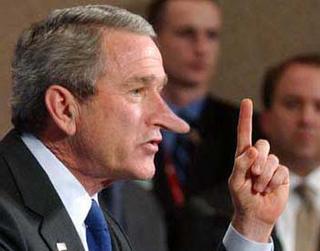More of the Same

From CJR Daily
President Bush's speech yesterday to the National Endowment for Democracy was billed as a major foreign policy pronouncement on the state of the "War on Terror." But it didn't seem to contain much new. The war was framed as it has been for the past four years as a battle between the forces of good and the forces of evil. The only slight change was that evil was a bit more fleshed-out this time, referred to as "evil Islamic radicalism," "militant Jihadism," and "Islamo-fascism."
There was, however, one piece of breaking news: Bush's announcement that "the United States and our partners have disrupted at least ten serious al Qaeda terrorist plots since September the 11th, including three al Qaeda plots to attack inside the United States." Also, "we've stopped at least five more al Qaeda attempts to case targets in the United States, or infiltrate operatives into our country."
The Bush administration has never given any details about specific successes in this front of the War on Terror. This was the first time any foiled plans had been mentioned, and it was a pretty dramatic statement on the surface.
Wow, ten serious al Qaeda terrorists plots diverted, that's good news ain't it? But there's more. . .
But only the Los Angeles Times went the full distance here, finding a way to include some important context for this list. In the process, it shed some serious doubt on the significance of these supposed terror-deterring achievements.
"Several senior law enforcement officials" quoted throughout the Times story "questioned whether many of the incidents on the list constituted an imminent threat to public safety and said that authorities had not disrupted any operational terrorist plot within the United States since the 2001 attacks on the World Trade Center and the Pentagon."
On Padilla, the Times' anonymous senior federal law enforcement officials say there isn't "any evidence of co-conspirators inside the U.S. or other indication that the plot had developed into any kind of operational plan." And as far as the other two planned domestic attacks, these same officials say that, at least the second wave attacks, "apparently never rose to the level of a coordinated plan. The Sept. 11 commission report said that Khalid Shaikh Mohammed ... became 'too busy' to complete the planning for subsequent strikes and that the plots did not progress beyond theoretical stages."
A federal counter-terrorism official added, "I don't think we ever resolved these." These were all plots that were "on the boards, but they never got anywhere," he said. Another federal counter-terrorism expert stated, "Everyone is allowed to count in their own way."

<< Home